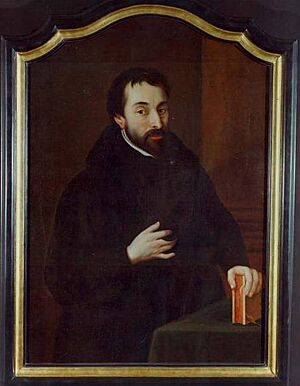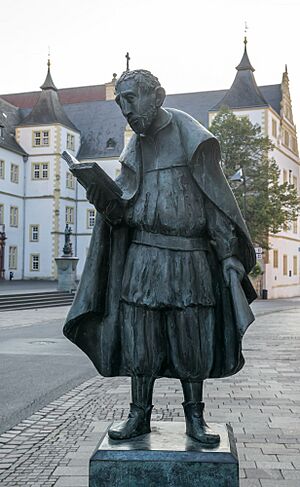Friedrich Spee facts for kids
Friedrich Spee (born February 25, 1591 – died August 7, 1635) was a German Jesuit priest, a teacher, and a poet. He is best known for strongly speaking out against witch trials. He was an "insider" who saw these trials happening during a time when many people in Europe were very afraid of witches. Spee argued fiercely against using torture, saying it was cruel and unreliable. He wrote, "Torture has the power to create witches where none exist."
Contents
Spee's Early Life and Education
Friedrich Spee was born in a town called Kaiserswerth, which is on the Rhine River. After finishing his first studies in Cologne, he joined the Society of Jesus in 1610. The Jesuits are a religious group within the Catholic Church.
Spee spent many years studying and working as a teacher. He taught in several cities, including Trier, Fulda, and Würzburg. In 1622, he became a Catholic priest in Mainz.
His Work as a Professor and Priest
In 1624, Spee became a professor at the University of Paderborn. He continued to teach in other places like Speyer and Cologne. He also worked as a priest, giving sermons in cities such as Paderborn and Hildesheim.
In 1629, someone tried to hurt Spee in a town called Peine. Luckily, he survived. He then went back to teaching and working as a priest in Paderborn and later in Cologne. In 1633, he moved to Trier.
Helping Others During War
In March 1635, during the Thirty Years' War, soldiers attacked Trier. Spee showed great courage by helping people who were suffering. He cared for wounded soldiers in a hospital. Sadly, he caught the plague while helping them and died soon after, on August 7, 1635.
Why Spee Fought Against Witch Trials
During Spee's time, many people believed in witches. They thought witches caused bad things to happen. This led to many witch trials across Europe. People accused of being witches were often tortured to make them confess.
Spee was one of the first people inside the legal system to speak out against these trials. He saw firsthand how unfair they were. He argued that torture was wrong because it made innocent people confess to crimes they didn't commit. He believed that fear, not real evidence, was driving these trials. His writings helped to change how people thought about witch trials and torture.
Images for kids
 | Aaron Henry |
 | T. R. M. Howard |
 | Jesse Jackson |





